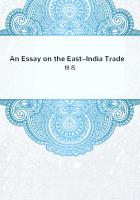Only I can't make out what, and the worry of it, the small rage of curiosity never to be satisfied, brings back what I remember to have felt, once or twice, after judging best, for reasons, to burn some important letter unopened. I've been sorry, I've hated it -I've never known what was in the letter. You may, of course, say it's a trifle - !""I don't say it's a trifle," Miss Staverton gravely interrupted.
She was seated by her fire, and before her, on his feet and restless, he turned to and fro between this intensity of his idea and a fitful and unseeing inspection, through his single eye-glass, of the dear little old objects on her chimney-piece. Her interruption made him for an instant look at her harder. "Ishouldn't care if you did!" he laughed, however; "and it's only a figure, at any rate, for the way I now feel. NOT to have followed my perverse young course - and almost in the teeth of my father's curse, as I may say; not to have kept it up, so, 'over there,' from that day to this, without a doubt or a pang; not, above all, to have liked it, to have loved it, so much, loved it, no doubt, with such an abysmal conceit of my own preference; some variation from THAT, I say, must have produced some different effect for my life and for my 'form.' I should have stuck here - if it had been possible; and I was too young, at twenty-three, to judge, POUR DEUXSOUS, whether it WERE possible. If I had waited I might have seen it was, and then I might have been, by staying here, something nearer to one of these types who have been hammered so hard and made so keen by their conditions. It isn't that I admire them so much - the question of any charm in them, or of any charm, beyond that of the rank money-passion, exerted by their conditions FORthem, has nothing to do with the matter: it's only a question of what fantastic, yet perfectly possible, development of my own nature I mayn't have missed. It comes over me that I had then a strange ALTER EGO deep down somewhere within me, as the full-blown flower is in the small tight bud, and that I just took the course, I just transferred him to the climate, that blighted him for once and for ever.""And you wonder about the flower," Miss Staverton said. "So do I, if you want to know; and so I've been wondering these several weeks. I believe in the flower," she continued, "I feel it would have been quite splendid, quite huge and monstrous.""Monstrous above all!" her visitor echoed; "and I imagine, by the same stroke, quite hideous and offensive.""You don't believe that," she returned; "if you did you wouldn't wonder. You'd know, and that would be enough for you. What you feel - and what I feel FOR you - is that you'd have had power.""You'd have liked me that way?" he asked.
She barely hung fire. "How should I not have liked you?""I see. You'd have liked me, have preferred me, a billionaire!""How should I not have liked you?" she simply again asked.
He stood before her still - her question kept him motionless. He took it in, so much there was of it; and indeed his not otherwise meeting it testified to that. "I know at least what I am," he simply went on; "the other side of the medal's clear enough. I've not been edifying - I believe I'm thought in a hundred quarters to have been barely decent. I've followed strange paths and worshipped strange gods; it must have come to you again and again -in fact you've admitted to me as much - that I was leading, at any time these thirty years, a selfish frivolous scandalous life. And you see what it has made of me."She just waited, smiling at him. "You see what it has made of ME.""Oh you're a person whom nothing can have altered. You were born to be what you are, anywhere, anyway: you've the perfection nothing else could have blighted. And don't you see how, without my exile, I shouldn't have been waiting till now - ?" But he pulled up for the strange pang.
"The great thing to see," she presently said, "seems to me to be that it has spoiled nothing. It hasn't spoiled your being here at last. It hasn't spoiled this. It hasn't spoiled your speaking - "She also however faltered.
He wondered at everything her controlled emotion might mean. "Do you believe then - too dreadfully! - that I AM as good as I might ever have been?""Oh no! Far from it!" With which she got up from her chair and was nearer to him. "But I don't care," she smiled.
"You mean I'm good enough?"
She considered a little. "Will you believe it if I say so? I mean will you let that settle your question for you?" And then as if ****** out in his face that he drew back from this, that he had some idea which, however absurd, he couldn't yet bargain away: "Oh you don't care either - but very differently: you don't care for anything but yourself."Spencer Brydon recognised it - it was in fact what he had absolutely professed. Yet he importantly qualified. "HE isn't myself. He's the just so totally other person. But I do want to see him," he added. "And I can. And I shall."Their eyes met for a minute while he guessed from something in hers that she divined his strange sense. But neither of them otherwise expressed it, and her apparent understanding, with no protesting shock, no easy derision, touched him more deeply than anything yet, constituting for his stifled perversity, on the spot, an element that was like breatheable air. What she said however was unexpected. "Well, I'VE seen him.""You -?"
"I've seen him in a dream."
"Oh a 'dream' - !" It let him down.
"But twice over," she continued. "I saw him as I see you now.""You've dreamed the same dream - ?"
"Twice over," she repeated. "The very same."This did somehow a little speak to him, as it also gratified him.
"You dream about me at that rate?"
"Ah about HIM!" she smiled.
His eyes again sounded her. "Then you know all about him." And as she said nothing more: "What's the wretch like?"She hesitated, and it was as if he were pressing her so hard that, resisting for reasons of her own, she had to turn away. "I'll tell you some other time!"



![慈氏菩萨所说大乘缘生稻[卄幹]喻经](https://i.dudushu.com/images/book/2019/09/29/061433000.jpg)











